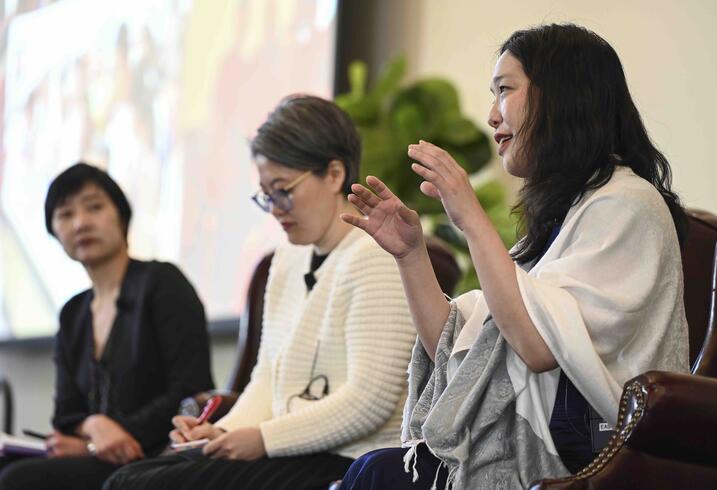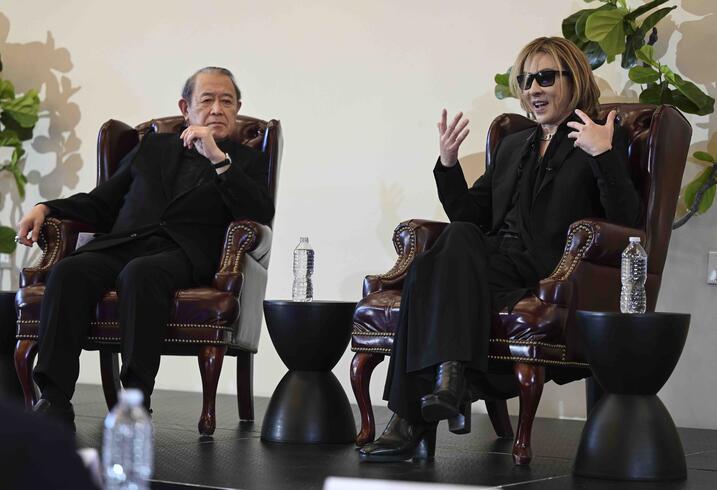Japanese and American Innovators Gather at Stanford to Examine the Future of Social Tech
Japanese and American Innovators Gather at Stanford to Examine the Future of Social Tech
Kicking off a special event series celebrating the 40th anniversary of Stanford’s Walter H. Shorenstein Asia-Pacific Research Center, the Japan Program convened eminent entrepreneurs, investors, educators, and content creators, including global rock star YOSHIKI, to explore pathways for social impact innovation.

Societies today are hungry for strategies and solutions that scale growth while improving social outcomes. To spur purpose-driven, innovative responses to the challenges before us, young people must develop skills and approaches grounded in agility, creativity, and empathy. Renowned Japanese rock star, composer, entrepreneur, and philanthropist YOSHIKI shared this advice for doing so:
“As long as you try to make the world a better place, you’ll find your passion. If you believe in yourself, you can conquer anything,” he said while headlining the conference The Future of Social Tech, held on February 23 at Stanford University. Speaking in front of a packed audience and thousands of viewers who tuned in to the livestream, YOSHIKI described how he overcame difficult times and what keeps him motivated. He encouraged Stanford students to redefine failure as a stepping stone to propel themselves forward and practice gratitude. “If you think that way, you can do pretty much whatever you want. Be your own rock star.”
Hosted by the Japan Program at the Walter H. Shorenstein Asia-Pacific Research Center (APARC), the conference kicked off a special event series celebrating APARC’s 40th anniversary. Titled Asia in 2030, APARC@40, the series highlights core areas of the center’s expertise, examines Asia’s transformation over the past four decades, and considers the drivers and shapers of the region’s future.
The conference gathered Japanese and American entrepreneurs, investors, content creators, and educators to share lessons and best practices to accelerate innovation for social impact, or “social tech.” It was the first major university keynote venue for YOSHIKI, a composer, classically-trained pianist, rock drummer, and the leader of the rock groups X Japan and The Last Rockstars. A global rock star and a living legend in Japan, YOSHIKI has pioneered a new brand of visual rock and style and has constantly been pushing his career in new directions, launching products and projects across diverse fields, from fashion and winemaking to finance and philanthropy.
Cultivating Japan-U.S. Partnerships
In his welcome remarks, APARC Director Gi-Wook Shin, the William J. Perry Professor of Contemporary Korea, noted that Japan was one of APARC’s primary research areas since its early beginnings and that the conference embraces that original spirit of keen engagement with Japanese affairs and fostering partnerships between Japan and the United States.
Consul General of Japan in San Francisco Yasushi Noguchi also offered welcoming remarks, expressing his pride in representing Japan in the United States, two key sources of globally successful technological advancements and content development in the past half-century. The Consul General's office has been critical for the growth of APARC’s Japan Program, generously supporting various activities such as student exchanges, research initiatives, conferences and workshops, and other educational and programming engagements.
As he opened the conference, Japan Program Director Kiyoteru Tsustui, the Henri H. and Tomoye Takahashi Professor in Japanese Studies and deputy director at APARC, explained that, when thinking of Japan in 2030, many Japanese envision a country that plays a positive force in a divided world and that once again becomes a leader of technological innovation. But while there is consensus that such innovation should have social benefits, few have offered clear pathways for realizing this direction. “This conference boldly seeks to find ways forward for entities in Japan and the United States to develop social tech,” said Tsutsui.





Investing in Natural Capital
The morning session of the conference opened with a panel on the future of the environment. Attendees heard from Reiko Hayashi, a director and deputy president at Bank of America Securities Japan Co., Ltd, about sustainable finance in the capital markets and efforts to promote sustainable finance in Japan. Hayashi highlighted steps that Japan’s government is taking to meet its 2050 net-zero goal, its multi-step policy on climate transition finance, and its 2021 revision of the corporate governance code to include sustainability.
Panelist Gretchen Daily, co-founder and faculty director of the Natural Capital Project (NatCap) and the Bing Professor of Environmental Science at Stanford, described the NatCap framework that integrates the value nature provides to society into all major decisions. NatCap partners with a network of hundreds of public and private sector institutions around the world. Daily emphasized that now is the time to capitalize on the momentum in climate action and connect government planners, multilateral financial institutions, private sector partners, and other stakeholders to deliver durable social and economic benefits while securing the world’s stock of natural resources.
Educating Social Innovators
The second panel, which focused on the future of sciences and arts education, featured two trailblazers working to equip new generations with skills and mindsets grounded in imagination, empathy, and curiosity. Sachiko Nakajima, an award-winning musician, mathematics researcher, and educator, shared insights from her work to democratize creativity. As the founder and CEO of steAm.Inc, Nakajima educates the public on the inherent connection between math and music and the importance of including the Arts in STEM (science, technology, engineering, and math). In particular, Nakajima aims to reduce gender disparities and pave the way for more women in STEAM in Japan.
Rie Kijima, an assistant professor and director of the Initiative for Education Policy and Innovation at the University of Toronto, noted that one goal we must strive for is to create an environment where young learners believe they can be catalysts of positive social change. Kijima is the co-founder of SKY Labo, an education nonprofit organization that promotes STEAM learning and design thinking in Japan. SKY Labo's definition of STEAM embraces a human-centered approach to tackling solutions in a playful, artful, soulful way that aims to cultivate a sense of purpose and meaning in young learners. “In our education system today, there's so much emphasis on success,” said Kijima, but one of SKY Labo’s messages is that “we need to fail in order to succeed; every time we fail, we fail forward.”





Strengthening Democracy, Combating Digital Echo Chambers
The afternoon panel shifted the focus to the future of democracy and digital media. Attendees heard from Ken Suzuki, CEO and co-founder of SmartNews, an award-winning news app on a mission to “deliver the world’s quality information to the people who need it.” SmartNews uses AI technology to collect trustworthy news from all over the world and organize it for users in simple interfaces. The app, which aims to burst news filter bubbles, includes what it calls a “News From All Sides” slider — a feature that allows users to get a range of perspectives from different publishers across the political spectrum. “We need an ecosystem with incentives to create high-quality content,” said Suzuki. “Democracy is at stake, but I believe that technology can be used for the good of society.”
The following discussion about paths to addressing the threats to democracy included Francis Fukuyama, the Olivier Nomellini Senior Fellow at Stanford’s Freeman Spogli Institute for International Studies (FSI), and Larry Diamond, the William L. Clayton Senior Fellow at the Hoover Institution and the Mosbacher Senior Fellow in Global Democracy at FSI. Fukuyama reminded the audience that technology itself never fully solved any human problems. “It's only to the extent that our political systems and institutions can guide technology and use it for socially beneficial purposes that technology actually ever manages to solve anything.” The real task, according to Fukuyama, is to figure out how to control the power of social media platforms and other big companies to silence and amplify content in a non-transparent way. He called for making it mandatory for internet platforms to enable users to choose the kind of content moderation they are served.
Diamond emphasized the need for more legal and regulatory action to increase transparency in the algorithms used by social media companies. It is also necessary to socialize social media users to seek multiple points of view and to understand that echo chambers are civically and democratically dangerous. Ultimately, said Diamond, robust civic education is the best way to teach young people about inquiry and rational debate and prepare them to use tools like SmartNews.
“The Hero Is Within You”
At the conference closing session, keynote speaker YOSHIKI joined Ichiro Fujisaki, former Japanese Ambassador to the United States, for a conversation about the future of the entertainment industry and content business. YOSHIKI talked about his experiences working in both Japan and the United States and pursuing new challenges in multiple fields. “The hero is within you,” he said. “It’s never too late to start anything.”
Reflecting on the future of society in the age of AI from his perspective as a musician and entrepreneur, YOSHIKI said, “If humanity is meant to destroy us, AI will do it faster; If humanity is meant to support each other, AI will support us. Let’s live to support each other and love one another, so that when the singularity moment comes, AI will support us.”













